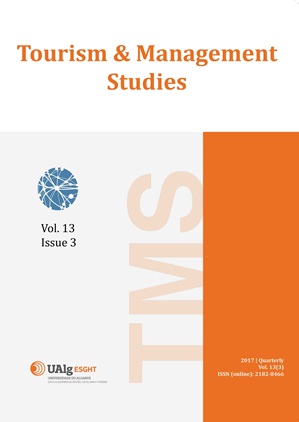The influence of ethical dilemmas in the accounting
DOI:
https://doi.org/10.18089/Keywords:
Ethics, Utility, Accounting, Behavioral, Need for CognitionAbstract
In this study a theoretical model of five dimensions is explained – Rest (1986) ethical decision making process; Jones (1991) moral intensity; need for cognition; personal attributes and financial information - in order to understand the conditions that lead policymakers to manipulate information and to understand the ethical issues in decision-making that lead or not, to a more useful accounting. The sample, by convenience, consisting of 442 individuals and this empirical study was conducted through a survey by an online questionnaire. Data collection was performed using SurveyMonkey® software and the model analysed by Structural Equation Analysis method. A structural model was obtained, seeming to indicate that the process of ethical and moral intensity decisions is associated with the individual need for cognition. The utility of accounting, preparation and presentation of financial statements are positively related to the educational level. In this sense, the results and the profitability of capital influence the moral intensity, it seems possible to conclude about the positive influence of academic ethics intention and accounting utility.
References
Almeida, B. & Silva, A. (2013). Integração das teorias explicativas da auditoria no modelo de accountability de Laughlin: análise teórica e empírica. Contabilidade e Gestão, 14, 43–102.
Barbosa, A. S. (2013). Características do gestor e estrutura de capital nas empresas cotadas. Dissertação de mestrado não publicada, Universidade de Aveiro, Aveiro.
Barnett, T. (2001). Dimensions of moral intensity and ethical decision making: An empirical study. Journal of Applied Social Psychology, 31(5), 1038–1057.
Barnett, T., & Valentine, S. (2004). Issue contingencies and marketers’ recognition of ethical issues, ethical judgments and behavioral intentions. Journal of Business Research, 57(4), 338–346.
Bazerman, M. & Moore, D. (2012). Judgment in managerial decision making (8th ed.), New York: John Wiley & Sons, Inc..
Blackburn, S. (1997). Dicionário de Filosofia. Lisboa: Editora Gradiva.
Cacioppo, J. & Petty, R. (1982). The need for cognition. Journal of Personality and Social Psychology, 42(1), 116–131.
Cacioppo, J., Petty, R. & Kao, C. (1984). The efficient assessment of need for cognition. Journal of Personality Assessment, 48, 306–307.
Ca?ibano, L. C., & Angulo, J. A. (1997). Los programas de investigación en contabilidad. Revista de Contabilidad, 0(0), 57–95.
Carlson, D., Kacmar, K., & Wadsworth, L. (2009). The impact of moral intensity dimensions on ethical decision making: Assessing the relevance of orientation. Journal of Managerial Issues, 21(4), 534–551.
Chaiken, S. (1980). Heuristic versus systematic information processing and the use of source versus message cues in persuasion. Journal of Personality and Social Psychology, 39(5), 752–766.
Cohen, J., Pant, L. & Sharp, D. (2001). An examination of differences in ethical decision-making between Canadian business students and accounting professionals. Journal of Business Ethics, 30(4), 319–336.
Coy, D., Fischer, M., & Gordon, T. (2001). Public accountability: a new paradigm for college and university annual reports. Critical Perspectives on Accounting, 12(1), 1–31.
Culhane, S., Morera, O. & Hosch, H. (2004). The factor structure of the Need for Cognition Short Form in a Hispanic sample. The Journal of Psychology, 138(1), 77–88.
Curseu, P. (2011). Need for cognition and active information search in small student groups. Learning and Individual Differences, 21(4), 415–418.
Deliza, R., Rosenthal, A. & Costa, M. (2003). Tradução e Validação Para a Língua Portuguesa de questionário utilizado em estudos de consumidor. Ciência e Tecnologia de Alimentos, 23(1), 43–48.
Feitosa, A. B. (2010). Excesso de confiança, otimismo e ancoragem em gestores da construção civil no Brasil: Estudo de caso da Camargo Correa. Projeto de Mestrado, ISCTE Business School, Lisboa.
Filho, R., Bruni, A. & Menezes, I. (2013). Validação do teste Need For Cognition: Um estudo em Contabilidade Comportamental. Psicologia, Ciência e Profissão, 33(71), 112–131.
Flannery, B. & May, D. (2000). Environmental ethical decision making in the US metal finishing industry. The Academy of Management Journal, 43(4), 642–662.
Forsterlee, R., & Ho, R. (1999). An examination of the short form of the Need for Cognition Scale applied in an Australian sample. Educational and Psychological Measurement, 59(3), 471–480.
Furnham, A., & Thorne, J. D. (2013). Need for cognition: Its dimensionality and personality and intelligence correlates. Journal of Individual Differences, 34(4), 230–240.
Gil, A. (2002). Como elaborar projetos de pesquisa (4.ª ed.). São Paulo: Editora Atlas.
Gomes, A., Santos, J., Gonçalves, G., Orgambidez-Ramos, A., & Giger, J.-C. (2013). Estudo de validação da Escala de Necessidade de Cognição com amostra portuguesa. Avaliação Psicológica, 12(2), 179–192.
Instituto Nacional de Estatística (2014). Empresas em Portugal 2012 - Destaque. Lisboa. Disponível em: www.ine.pt/xportal/xmain?xpid=INE&xpgid= ine_publicacoes&PUBLICACOESpub_boui=210758098&PUBLICACOESmodo=2, (acedido em: 10.01.2015).
Jones, T. (1991). Ethical decision making by individuals in organizations: An issue-contigent model. The Academy of Management Review, 16(2), 366–395.
Jones, T. & Huber, V. (1992). Issue contingency in ethical decision making. International Association for Business and Society Proceedings, 156, 166.
Kahneman, D. & Tversky, A. (1979). Prospect Theory: An Analysis of Decision under Risk. Econometrica, 47(2), 263–292.
Downloads
Published
Issue
Section
License
Copyright (c) 2017 Tourism & Management Studies

This work is licensed under a Creative Commons Attribution-NoDerivatives 4.0 International License.
The journal retains published articles’ copyrights, but they are simultaneously licensed under the Creative Commons Attribution License (CC BY-NC-ND), which allows individuals’ to share the relevant papers as long as authorship and publication in this journal are duly acknowledged.



